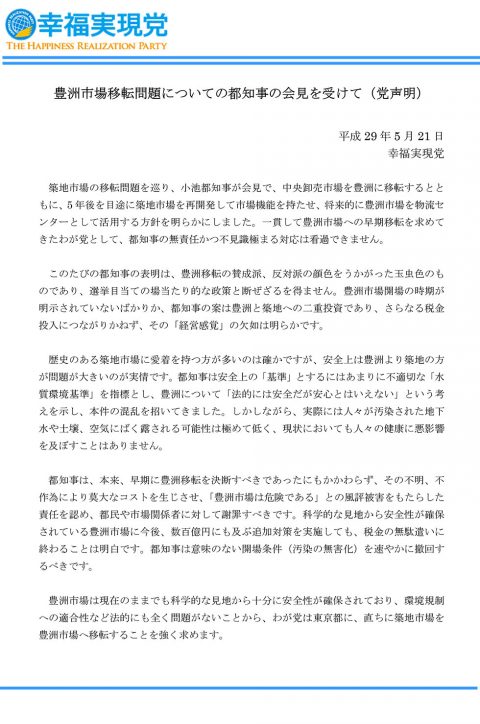2017,06,03
Happiness Realization Party
Mr. Donald J. Trump, President of the United States of America, officially announced that the United States would withdraw from the 2015 Paris Agreement, an international framework on climate change. The Happiness Realization Party (HRP) supports his decision.
The Kyoto Protocol, adopted in 1997, was an unfair and unworkable international framework under which only a portion of developed countries shouldered greenhouse gas (GHG) emission reduction obligations that were assigned by the United Nations. Furthermore, the United States withdrew from the Protocol, and the People’s Republic of China, which is considered a “developing country” under the Protocol, was not given any emission reduction obligations in the Protocol. In light of these failures, the Paris Agreement was adopted with the aim of establishing a fair and workable international framework in which all countries participate and shall pursue their domestic measures to achieve their Nationally Determined Contributions (NDCs) that are their own voluntarily-set emission reduction targets. The Agreement entered into force in November 2016.
However, in the Paris Agreement, there are some considerable differences among the countries with regard to the difficulty of achieving NDCs. In the case of the United States and Japan, whose targets are total emission reduction rates, there is a possibility that reducing emissions will inhibit economic growth. Meanwhile, China, whose target is an emission reduction rate relative to gross domestic product (GDP), will be able to achieve its emission reduction target while increasing its GHG emissions through 2030 and not sacrificing any economic growth at all. As such, it is an undeniable fact that the Paris Agreement is substantively an extremely favorable and advantageous international framework for China.
One of the reasons President Trump gave for withdrawal is that the Paris Agreement is disadvantageous for the US economy while advantageous for China, and this is clear when the NDC that the preceding Obama Administration decided on is compared with the NDC of China.
Also, to begin with, the hypothesis that anthropogenic GHGs are the main cause of a global temperature rise has non-negligible uncertainties, and even the Intergovernmental Panel on Climate Change (IPCC), which is an organization of scientists specializing in climate change, recognizes uncertainty of the equilibrium climate sensitivity.
Thus, in regard to the issue of climate change, since there are strong elements of economic and diplomatic strategy-based maneuvering by countries under globalism, and since the scientific knowledge at its base has uncertainties and still does not extend beyond a hypothesis, the HRP has consistently called for a fundamental overhaul of current climate change policies.
As for the recent announcement of the withdrawal by President Trump, it is not certain whether the United States will be able to promptly withdraw from the Paris Agreement. According to the provisions of the Paris Agreement, withdrawal is not possible for more than three years, so the United States may withdraw from the parent convention, the United Nations Framework Convention on Climate Change (UNFCCC).
However, in any case, there definitely moves underway by the Trump Administration to fundamentally overhaul the energy and climate change policies of the preceding Obama Administration and shift toward policies focusing on economic growth and national security.
If Japan stays as-is in the Paris Agreement, which extends the influence of China and the European Union (EU), this will impose limitations on the economic growth and national security of Japan alone.
The HRP strongly calls for the Government of Japan to closely watch the trends related to the withdrawal of the United States from the Paris Agreement, to support the diplomatic position of the United States as its ally, and to change its policies in order to secure the national interest of Japan, including having Japan withdraw from the Paris Agreement, significantly weakening emission reduction target, and repeal the Plan for Global Warming Countermeasures decided in May 2016 by the Government of Japan.
Based on the stance of Japan first, the HRP intends to abolish irrational regulations and directives related to energy, enable free and vigorous economic activities, promote a domestic revival of the manufacturing industry by reducing energy costs, and realize the securing of employment and the increasing of income.
)






